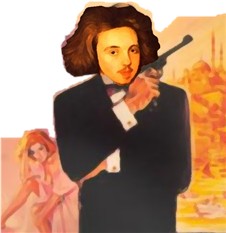'The name is Marlowe . . . Kit Marlowe'

The playwright and spy Christopher Marlowe was baptized on this day in 1564 in Canterbury, Kent, England.
The son of a shoemaker, Marlowe's intellectual gifts were recognized early by a local philanthropist, who sent him to the prestigious Kings School. He went on to Corpus Christi College, Cambridge, from which his benefactors expected he would pursue a career in the clergy, but literature and theater were more to the impetuous young man's taste, and he showed his talent in them by translating Lucan's De Bello Civili into blank verse and Ovid's Amores into rhyming couplets, and writing his first full-length play, now lost, The True History of George Scanderbeg (1582), about a heroic yet chaste Albanian prince who is kidnapped and renamed by the Turks, but returns to lead his people to victory.
Contemporaries of Marlowe seemed to think he particularly identified with Scanderbeg, which may explain his willingness, shortly after receiving his B.A. in 1584, to enter Queen Elizabeth's service as a spy. At that time, many European heads of state were either assassinated or suffered assassination plots as part of the shifting of power between Catholics and Protestants. William the Silent of Orange, Henry III of France and Henry IV of France all fell victim to assassins, but the English secret service (under Sir Francis Walsingham) kept Elizabeth safe with the era's most successful network of espionage, and there is evidence that Marlowe played a role in foiling the Catholic "Babbington Plot" of 1587 as an agent of the Queen. His role as a "double agent" in the Catholic-Protestant conflict may also explain the charges of "atheism" (still punishable by burning at the stake) leveled against him by rival playwright Thomas Kyd, which were pending against him at the time of his death.
While acting in the Queen's service, Marlowe also began to write for the London theater company of the Admiral's Men. His first performed work, the ambitious Tamburlaine the Great (1586-7) burst onto the London scene as the first play written in English blank verse. Other successes, including The Tragical History of Doctor Faustus (1588) and The Famous Tragedy of the Rich Jew of Malta (1589), follow the theme he essayed in Tamburlaine of a larger-than-life protagonist who is driven by a passion that ultimately destroys him. In these plays and in Edward II (1594), Marlowe shows his ability to endow the blank verse line with intense dramatic power, in effect paving the way for the finest work of William Shakespeare, his London contemporary, and John Milton.
A notoriously reckless character, Marlowe's death remains suspicious, especially in light of the fact that he was in the company of three government spies. He met his colleagues at a roominghouse, and soon a brawl erupted over who would pay the bill. Marlowe drew his dagger and hit Ingram Frizer on the head with the flat of it; whereupon Frizer wrestled the dagger away from Marlowe and stabbed him over the eye. Marlowe died, swearing (presumably on May 30, 1593 in Deptford, England), and Frizer was let off with a claim of self-defense.
A small number of mush-headed scholars have claimed that, due to his political intrigues, Marlowe actually faked his own death and went into hiding, using his superior knowledge of classical antiquity, geography, astronomy and the like as the ghost-writer of Shakespeare's greatest plays. This bit of wishful thinking obviously underestimates the value of his known achievements, of the impact that a 29-year old smart alecky rapscallion could have on generations of readers to come. His super-suave portrayal by Rupert Everett in Tom Stoppard's film Shakespeare in Love (1998) is entertaining, but of course Marlowe's real story might have made a great movie on its own.
Labels: Literature, Shakespeare, Theater





2 Comments:
There is an 'almost' movie/documentary on Marlow's death in the In search of Shakespeare (http://www.bbc.co.uk/history/programmes/shakespeare/)
T.V. programme: Jolly good fun and interesting reflections on Marlow's "other" life.
Well worth watching if you can get your hands on it.
Kit is still very much alive. He's living in the United States, pursuing a career as an actor. His name is Kit Farrell.
Post a Comment
Subscribe to Post Comments [Atom]
<< Home